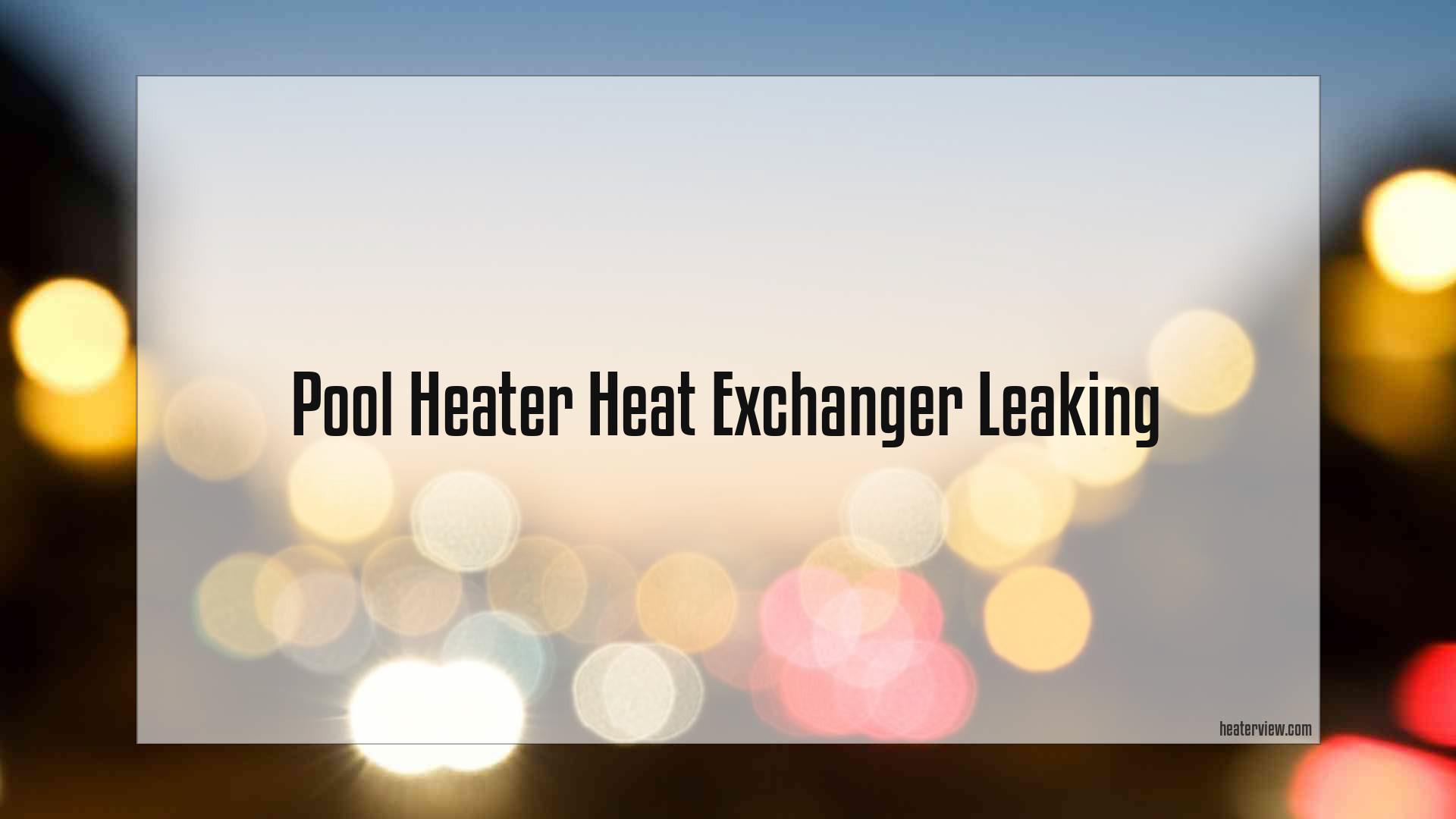If you have a pool heater heat exchanger that is leaking, there are a few things that you can do in order to fix it. First, you will need to determine where the leak is coming from. If the leak is coming from the seam of the heat exchanger, you can try to seal it with a silicone sealant. If the leak is coming from a hole in the heat exchanger, you will need to patch it with a metal patch. Once you have determined where the leak is coming from and have fixed it, you will need to refill the pool heater with water.
How Can You Tell If Your Pool Heater’s Heat Exchanger Is Leaking?

If your pool heater’s heat exchanger is leaking, you may notice a decrease in heating performance, an increase in your energy bills, or water pooling around the heater. If you suspect your heat exchanger is leaking, it’s important to contact a qualified pool heater technician to inspect and repair the unit.
What Are Some Common Causes Of Heat Exchanger Leaks In Pool Heaters?
If you’ve ever had a pool heater leak, you know how frustrating it can be. Not only does it cause your pool to lose heat, but it can also be a huge pain to fix. In this article, we’ll discuss some of the most common causes of heat exchanger leaks in pool heaters.
1. Poorly Maintained Pool Heater
One of the most common causes of heat exchanger leaks is a poorly maintained pool heater. If your heater isn’t properly serviced and maintained, it can develop rust and corrosion over time. This can eventually lead to leaks.
2. Incorrect Water Chemistry
Another common cause of heat exchanger leaks is incorrect water chemistry. If your pool’s water isn’t properly balanced, it can cause the metal components of your heater to corrode and break down. This can eventually lead to leaks.
3. High Water Temperatures
One of the most common causes of heat exchanger leaks is high water temperatures. If your pool’s water is too hot, it can cause the metal components of your heater to expand and break down. This can eventually lead to leaks.
4. Poorly Designed Pool Heater
One of the most common causes of heat exchanger leaks is a poorly designed pool heater. If your heater isn’t designed properly, it can develop problems over time. This can eventually lead to leaks.
5. Manufacturing Defects
One of the most common causes of heat exchanger leaks is manufacturing defects. If your heater is defective, it can develop problems over time. This can eventually lead to leaks.
If you suspect that your pool heater is leaking, it’s important to have it checked out by a professional as soon as possible. Leaks can cause serious damage to your pool and your heater, so it’s important to nip them in the bud as soon as possible.
What Are The Consequences Of A Heat Exchanger Leak In A Pool Heater?
If you have a pool heater, it’s important to know the consequences of a heat exchanger leak. A heat exchanger is what helps transfer heat from the burner to the water in the pool. If there is a leak in the heat exchanger, it can cause a few different problems.
One problem is that it can cause the burner to overheat. This can damage the burner and potentially cause a fire.
Another problem is that it can cause the water in the pool to overheat. This can be dangerous for anyone swimming in the pool.
Finally, a heat exchanger leak can also cause the pool pump to overheat. This can damage the pool pump and cause it to break down.
If you suspect a heat exchanger leak in your pool heater, it’s important to have it repaired as soon as possible. Otherwise, you could be facing some serious consequences.
How Can You Repair A Leaking Heat Exchanger In A Pool Heater?
If your pool heater is leaking, it’s important to take care of the problem as soon as possible. A leaking heat exchanger can not only cause your energy bills to go up, but it can also cause damage to your pool and your home.
There are a few different ways that you can repair a leaking heat exchanger in a pool heater. One way is to simply replace the heat exchanger. This is the most expensive option, but it will definitely fix the problem.
Another option is to try and repair the heat exchanger yourself. This is a cheaper option, but it’s important to know what you’re doing before you attempt this. If you’re not comfortable working with tools and plumbing, it’s probably best to leave this option to the professionals.
If you decide to try and repair the heat exchanger yourself, the first thing you’ll need to do is turn off the power to the pool heater. Once the power is off, you can remove the heat exchanger from the pool heater.
Once the heat exchanger is removed, you’ll need to inspect it for any damage. If there is any damage, you’ll need to replace the damaged parts. If there is no damage, you can simply clean the heat exchanger and put it back in the pool heater.
It’s important to make sure that the heat exchanger is properly sealed before you put it back in the pool heater. If it’s not properly sealed, it could leak again and cause further damage.
Once the heat exchanger is properly sealed, you can turn the power back on to the pool heater and test it out. If it’s still leaking, you may need to call a professional to come and take a look at it.
Leaking pool heaters can be a pain, but with a little bit of work, you can usually fix the problem yourself. If you’re not comfortable working with tools and plumbing, it’s probably best to call a professional. But if you’re willing to put in a little bit of work, you can usually fix the problem and save yourself some money.
How Can You Prevent Heat Exchanger Leaks In Pool Heaters?
If you own a pool, you know that a pool heater is a must in order to keep the water at a comfortable temperature. But what you may not know is that heat exchangers are prone to leaks. Here are some tips on how to prevent heat exchanger leaks in pool heaters:
1. Check the condition of the heat exchanger regularly. If you notice any cracks or damage, replace it immediately.
2. Make sure that the heat exchanger is properly sized for your pool. An undersized heat exchanger will be more likely to leak.
3. Install a heat exchanger check valve. This will help to prevent water from backflowing into the heat exchanger and causing a leak.
4. Have your pool heater serviced regularly by a qualified technician. This will help to identify any potential problems before they cause a leak.
Following these tips will help to prevent heat exchanger leaks in pool heaters. By being proactive and taking preventive measures, you can avoid the costly repairs that are necessary to fix a leaking heat exchanger.
Hopefully, you are clear on how to fix a pool heater heat exchanger leak. If you still have any questions, feel free to comment below.


